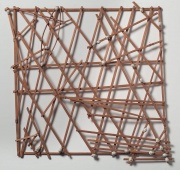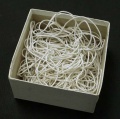Difference between revisions of "Twine"
Jump to navigation
Jump to search
(username removed) |
m (Text replace - "== Authority ==" to "== Sources Checked for Data in Record ==") |
||
| Line 15: | Line 15: | ||
| − | == | + | == Sources Checked for Data in Record == |
* G.S.Brady, ''Materials Handbook'', McGraw-Hill Book Co., New York, 1971 Comment: p. 236 | * G.S.Brady, ''Materials Handbook'', McGraw-Hill Book Co., New York, 1971 Comment: p. 236 | ||
Revision as of 21:35, 1 May 2016
Description
A strong cordage fiber composed of two or more strands plied together. Twine is typically made from natural cellulose fibers, such as cotton, jute, hemp, abaca, or sisal. The thin cords, measuring less than 0.5 cm in diameter, are primarily used for clothes lines, wrapping packages, and making nets.
Synonyms and Related Terms
string, cord
Additional Images
Sources Checked for Data in Record
- G.S.Brady, Materials Handbook, McGraw-Hill Book Co., New York, 1971 Comment: p. 236
- Hoechst Celanese Corporation, Dictionary of Fiber & Textile Technology (older version called Man-made Fiber and Textile Dictionary, 1965), Hoechst Celanese Corporation, Charlotte NC, 1990
- Art and Architecture Thesaurus Online, http://www.getty.edu/research/tools/vocabulary/aat/, J. Paul Getty Trust, Los Angeles, 2000
- Wikipedia, the free encyclopedia, at http://www.wikipedia.com Comment: http://en.wikipedia.org/wiki/Twine (Accessed Sept. 20, 2005): largest ball of twine in Darwin Minnesota made by Francis Johnson (12 feet indiameter)

